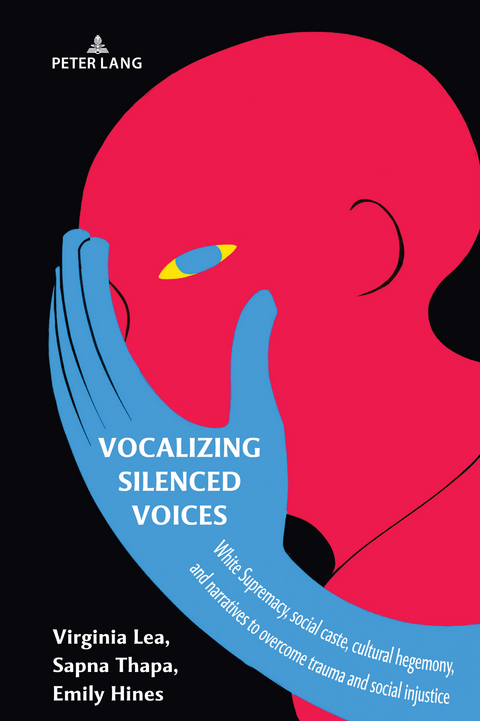
Vocalizing Silenced Voices
Peter Lang Publishing Inc (Verlag)
978-1-4331-5219-1 (ISBN)
In this book, we argue that authoritarian forces are working harder than ever to maintain, reinstate, and pass laws and policies that are antithetical to a kind, equitable, and socially just society that meets all of its citizens’ needs. American cultural hegemony—the dissemination process by which people are persuaded through laws and policies, institutional and cultural ideologies, norms, values, and practices to privilege the interests of powerful, disproportionately white, highstatus, and wealthy individuals and families—is ubiquitous. We learn to take for granted that the capitalist, social caste system in which we live, in largely segregated, racial, ethnic, and social class communities, is the best and fairest of all possible systems and just ‘the way things are.’ For example, large numbers of media and educational programs sell white supremacy, racism, social caste, sexism, and other forms of discrimination, as normal, natural, and common sense. Few schools teach children to become critically conscious of the hegemonic process by which social hierarchy in the United States has been handed down over more than four hundred years.
Our research in this book names some of the above-mentioned laws, policies, and ways of framing reality that maintain the inequitable system in which we live, and silence and traumatize students, faculty, staff , and social justice activists in education and beyond. It also includes some alternative narratives being enacted by extraordinary educators, supporting collective action, critical consciousness, accountability, hope, equity, and social justice. Despite some social change, social caste continues to de- ne our lives. So, those of us who value democracy, equity, and social justice need to contribute, collectively and individually, to help our students and communities see through the gaslighting that conceals the lack of historical and current equity in our society—in other words, to recognize how cultural hegemony works to reproduce inequities.
Virginia Lea, Ph.D, is Executive Director of the Educultural Foundation, and Professor of Education Emerita at Sonoma State University and the University of Wisconsin-Stout. Her several books, articles and curricula focus on unmasking cultural hegemony and white supremacy, and contributing to greater equity, social justice, antiracism, and educulturalism. Dr. Sapna Thapa is an Associate Professor and Coordinator of the Urban Early Childhood Teacher Education at Metro State University in Saint Paul, Minnesota. Her research areas focus on cross-cultural investigations of equity, quality, and diversity in early childhood teacher education. Her publications include articles related to policies on equity and quality in early childhood education and how globalization has raised the expectations of readiness for young children. Emily Hines, Ed.D, is a Professor of Reading at the University of WisconsinStout. She facilitates graduate reading programs and online professional development for K-12 educators. Emily’s research focus is literacy and diversity, where she believes the two intersect and are interdependent. Emily continues to grow and develop in her cultural competence and antiracism efforts.
List of Illustrations – Acknowledgments – Preface – Author Narratives – Virginia Lea, Sapna Thapa and Emily Hines, with a Postscript by Dang Yang: Introduction: Contextualizing Silenced Student, Faculty, Staff, and Community Voices in Higher Education – Virginia Lea, Sapna Thapa and Emily Hines: Hegemonic Practices Designed to Maintain the U.S. Social Order – Virginia Lea, Sapna Thapa and Emily Hines: Research on Silenced Student Voices in the Context of Covid-19 and Anti-racist Protest: Methodology – Virginia Lea, Sapna Thapa and Emily Hines: Research on Silenced Student Voices in the Context of Covid-19 and Anti-racist Protest: The African American, Hmong and Latinx Cohorts – Emily Hines, Virginia Lea and Sapna Thapa: Research on Silenced Student Voices in the Context of Covid-19 and Anti-racist Protest: The White Cohort, White Privilege and White Supremacy – Kimmery Newsom, Robert Ahlquist, Areeba Ali, Mayana Geathers, Josh Herron, Jean Ishibashi, Babatunde Lea, Brian Jackson, Tanya Lazar-Lea and Brandon Thoms: Community Activism: Faculty, Staff and Community Perspectives on Race, Racism and Whiteness – Sapna Thapa, Virginia Lea and Emily Hines: Campus Activism: "E-Race and E-Radicate Stereotypes" Dialogues and "Breaking Barriers" – Virginia Lea, Sapna Thapa and Emily Hines: A Framework for Identifying How Voices Are Silenced by Racism, Social Caste and White Supremacy – Virginia Lea, Sapna Thapa and Emily Hines: Conclusions: Toward a More Perfect Vocalizing of Student, Faculty and Community Voices – Appendix 1: Definitions of Theory – Appendix 2: Social Justice, Counter-Hegemonic Resources –Appendix 3: Student Participants in Our Original Research – Notes on Contributors – Index.
“Vocalizing Silenced Voices gives readers a clear and urgent sense of what hegemony means and how it operates to maintain racially unjust social relations. In this book, Lea, Thapa, and Hines take us through their work attempting to make visible and disrupt cultural hegemony on a university campus. While their work uncovered wrenching stories of pain, silencing, and anger in a sea of white apathy, the authors also offer strategies of hope.”University Monterey Bay, Member, National Academy of Education
Christine Sleeter
Professor Emerita, California State University Monterey Bay, Member, National Academy of Education
“An important and timely book based on a decade of ethnographic studies with students, faculty, staff, and community members by The Hegemony Project. The authors not only detail the history and presence of cultural hegemony and its strategies and tools -- such as racism, whiteness, white supremacy -- used to silence those critical voices that demand change and thereby threaten established socio-economic structure but also provide counter-silencing strategies to interrupt silencing and make all voices heard. A must-read.”
Ana Cruz
Professor of Education, St. Louis Community College.
"As censorship regimes ramp up today, it's important to remember that educational institutions have long functioned to silence diversity and criticality in various ways, even as such hegemony has always been contested in ways both obvious and not. In Vocalizing Silenced Voices, Lea, Thapa, and Hines provide us with a timely and practical framework for understanding who, how, where, and why institutions silence, as they humbly invite us into their own journey of creating spaces of resistance and movement building, showcasing through a rich tapestry of student voices that anti-oppressive education is messy, yes, but doable and enlivening as well."
Kevin Kumashiro
Author of "Surrendered: Why Progressive are Losing the Biggest Battles in Education"
“As politics rage within and outside the academy, this book lays bare the conscious and unconscious strategies used by anti-democratic, authoritarian individuals and groups who attempt to silence the voices and actions of social justice advocates, including education, ethnic studies and liberal arts students, faculty, staff, nonprofit workers and community members. The authors identify how whiteness, white supremacy, social caste and other powerful ideologies, interwoven with socio-economic structures, maintain gross inequities. They provide knowledge that is essential for the foundational work of pre-service and practicing teachers and the above actors, who struggle to meet the needs of their constituencies. I recommend this book and the dialogue to which it contributes about how we can build a more critically conscious and structurally just society.”
Theresa Montano
Professor, Chicana/o Studies, California State University Northridge.
| Erscheinungsdatum | 29.05.2024 |
|---|---|
| Zusatzinfo | 6 Illustrations |
| Verlagsort | New York |
| Sprache | englisch |
| Maße | 152 x 229 mm |
| Gewicht | 389 g |
| Themenwelt | Kinder- / Jugendbuch ► Sachbücher ► Religion / Philosophie / Psychologie |
| Geisteswissenschaften ► Psychologie ► Pädagogische Psychologie | |
| Sozialwissenschaften ► Pädagogik ► Didaktik | |
| Sozialwissenschaften ► Soziologie | |
| ISBN-10 | 1-4331-5219-3 / 1433152193 |
| ISBN-13 | 978-1-4331-5219-1 / 9781433152191 |
| Zustand | Neuware |
| Haben Sie eine Frage zum Produkt? |
aus dem Bereich


